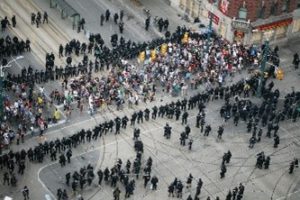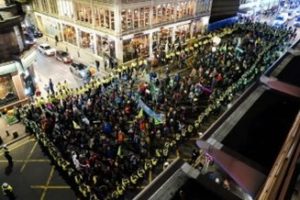Are you watching footage of the COVID protests? You might notice the police using a crowd control tactic called ‘kettling.’
This post unpacks the meaning and origin of this expression.
Meaning
The term ‘kettling’ refers to a crowd control tactic employed by police forces in the United States, Europe, the UK, Australia, and New Zealand. The kettling tactic involves officers surrounding an unruly crowd, preventing them from leaving the area they’re protesting in.
This strategy prevents the crowd from spilling out to harm bystanders. It also allows the police to identify the troublemakers in the group. It’s a remarkably effective crowd control tactic used during large-scale protests.
Kettling can sometimes involve using a mesh fence to create a physical barrier between the police and the protestors.
Example Usage
“The COVID-19 protests were crazy to watch. Huge crowds were outnumbering the police. However, the ‘kettling’ tactic used by officers helped them control the crowds.”
“I remember watching the protests on the TV during the pandemic. The ‘kettling’ tactic used by the police to control the crowds is quite effective.”
“Some activists argue that the police tactic of ‘kettling’ is nothing more than intimidation and an abuse of human rights.”
“Isn’t it amazing how all the police forces in the developed world use ‘kettling’ during the COVID protests? It’s like they all got the same training.”


Origin
The word 'kettling' came to the forefront of media reports during the COVID protests in England and Australia in 2020. However, the tactic was previously used by New York Police during the 'Occupy Wall Street' movement in 2011 and during the G20 global leadership summit in 2009.
The 'kettle' refers to the area where the protestors are taking action. The police surround the protestors, with some experts comparing the activity to a boiling kettle threatening to spill over.
Another theory regarding the name of the tactic comes from a connection to the German word 'Kessel,' meaning "cauldron or boiler." However, language experts believe the true origin of the tactic and its name comes from military-speak where an armed force is about to experience defeat at the hands of a superior military.
Many activists suggest 'kettling' is an unlawful practice by the police since it contains protestors and bystanders in the same space unjustly, creating the potential for the conflagration of emotions by the crowd.
Some police departments around the globe, such as Toronto, have denounced the practice and sworn never to use it in crowd control.
Phrases Similar to Kettling
- Riot tactics.
- Crowd control.
Phrases Opposite to Kettling
- Freedom.
- Defund the police.
What is the Correct Saying?
- Kettling.
Ways People May Say Kettling Incorrectly
The expression ‘kettling’ doesn’t have anything to do with a kettle or boiling water in a kettle. It refers to a police anti-riot tactic used to suppress aggression and control crowds. The term has nothing to do with kettles or kitchenware.
Acceptable Ways to Phrase Kettling
You can use the expression ‘kettling’ when referring to police tactics employed in the UK during the COVID-19 riots. During these protests, people would gather in large numbers. The police would form a ring around them, ‘kettling’ them in.
So, you can use the term to refer to situations where the police or groups of people surround you and prevent you from leaving. The tactic is employed by police riot control squads around the globe, including in countries like the UK, France, Germany, and Australia.